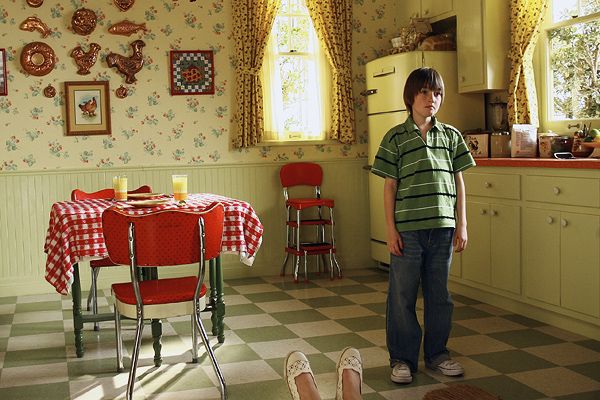Many people have or wish they had a special talent. Whether it’s juggling knives, playing an instrument or being able to recite pi to 100 digits, people love things that are strange or unusual, showing the many weird and wonderful things humans can achieve. One talent much less coveted, or even thought of, is the ability to wake the dead. Oh and to bake really great pies.
These talents belong to Ned, the adorable, socially awkward lead of the TV series Pushing Daisies. Played expertly by Lee Pace, the show explores Ned’s battle between using his gifts, the caveats that constrain them and his own sense of morality. Much like in real life, his abilities are bound by certain rules. Two to be exact, and they govern the shape and style of the entire show and make ground this unbelievable trait in reality.
Handily, the smooth voiced narrator (Jim Dale) summarises these at the start of each episode, often with an example from Ned’s elusive past (Adult Ned doesn’t talk about the past and isn’t too fond of the future either).
Rule number 1) on first touch, life, on second touch, dead again, forever. As Ned restrains from most physical contact anyway this seems like quite an easy rule to follow. However, it’s more difficult to anticipate the movements of the grateful once-dead and even an accidental brush will send them back to oblivion. This rule is a permanent one; no amount of time will make people immune.
Rule number 2) a dead thing can only be brought to life for 60 seconds or something else has to die in its place. This world-balancing exchange is all relative however. Say, for example, Ned brought a squirrel back to life for more than 60 seconds, another squirrel or rodent would die in its place. However, if you bring back a human, a human has to replace them, making Ned’s good intentions take on a deadly twist.
So in summary, it’s not all sunshine and rainbows but does have it’s uses. For example, in order to save his beloved restaurant, Ned teams up with a Private Investigator, Emerson Cod (Chi McBride) who uses Ned’s gift to help him solve cases and bring in as much money as possible. After all, it’s easier to solve a murder if you can ask the victim who did it.
However, although it’s clear Ned is a unique individual, he’s by no means the only one with hidden talents. In fact the majority of the characters who appear, however briefly, have some form of weird hobby. For example, Emerson Cod knits when he’s stressed, Charlotte ‘Chuck’ Charles (Anna Friel), Ned’s childhood sweetheart and revived murder victim can speak several languages and keeps bees. Her Aunts and childhood caretakers, Lily (Swoosie Kurtz) and Vivian (Ellen Greene), recluses with various mood disorders, used to be a synchronised swimming duo. These hobbies not only flesh out the characters but also provide an unexpected twist to the traditional roles we expect the characters to fall into, giving a surprisingly fresh outlook on an otherwise quite restricted genre.
Even the show’s settings and backdrop allow the mundane of the everyday to exist alongside the impossible. Or, to be precise, just one impossible. The scenery is bold, bright and big, contrasting to Ned’s reluctance to engage in a wider world outside his restaurant and home. The focus on such colours as yellows and blues contrast other shows’ predominately darker colour palettes to denote death and murder show that Pushing Daises is supposed to be light-hearted and almost playful.
The dialogue is witty without relying on stereotypes to push the humour and the plots of each episode are interesting and engaging, as not every murder victim can give them a straight answer showing every ‘foolproof plan’ has its flaws. The focus is on the characters’ relationships as much as the crimes they’re investigating, which is built upon throughout the series. Also, the show really explores the idea that everyone has something they want to hide and the consequences that go with this, but in a manner which shows problems that seem insurmountable can be dealt with, providing a healthier world view than some other shows which simply leave challenges to fester.
Pushing Daisies isn’t meant to be taken seriously. It’s witty, charming, and hopeful in equal measure towards its macabre subjects and it is this inversion which makes it so engaging. The main message seems to be that however odd you think your own talent (and, even broader, life) is, chances are someone out there is always going to be weirder, and that embracing a talent can prove to be more useful than suppressing one.
Abigail Houseman
Click here for more Watch This If…
What do you think of Pushing Daises? Let us know on Facebook and Twitter, or leave a comment.



















